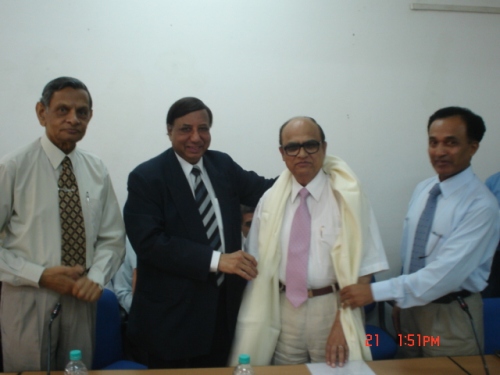21 May 2007|Noida | Amity University Campus, Sector-125, Noida
Three Months Certificate Course on Disaster Management started at Amity
 In a pioneering initiative, Amity Institute of Disaster Management started a unique programme on Disaster Management of three months duration sponsored by Ministry of Defence, Government of India from April 23, 2007-July 13, 2007 for officers of the Defence Forces and other professionals at Amity University Campus, Noida.
In a pioneering initiative, Amity Institute of Disaster Management started a unique programme on Disaster Management of three months duration sponsored by Ministry of Defence, Government of India from April 23, 2007-July 13, 2007 for officers of the Defence Forces and other professionals at Amity University Campus, Noida.
The main objective of organizing this course is to build a pool of trained and dedicated professionals who can contribute to the development of policies, measures and programmes for disaster management at various levels. Several niche areas on disaster management have been discussed so far including introduction and dimensions of natural and anthropogenic disasters, principles/components of disaster management, organizational structure for disaster management, disaster management schemes/SOPs, natural disasters and mitigation efforts, flood control, drought management, cyclones, avalanches, mangroves, land use planning, interlinking of rivers, role of Union/States, role of armed forces/other agencies in disasters, important statutes/ legal provisions, IEDs/bomb threat planning, NBC threat and safety measures, forest fires, oil fires, crisis in power sector, accidents in coal mines, terrorism and emergency management, case studies, filed visits, dissertation and project work.
Lt Gen JR Bhardwaj, PVSM, AVSM, VSM, PHS (Retd), Hon'ble Member of National Disaster Management Authority addressed the officers today on the topic "The Role of Medical Services in Disaster Management” and lauded the efforts of Amity in taking such an initiative. Addressing the participants he said, “Amity is not only providing education but also national character building to the students I really hope that every Institute in India must take disaster management as a specialized subject the way Amity is doing ”. Addressing the role of medical services during disasters Gen JR Bhardwaj, laid stress on certain aspects which can reduce morbidity and mortality, in addition to proper recovery and rehabilitation of affected people, capacity development i.e. the selection of dedicated team is the first step in capacity building and formulation of QRMT consisting of Doctor, Nursing Asst), infrastructure development (effective communication establishment, protective clothing, detection equipment and decontamination material for NBC casualties),capacity development during emergency (proper maintenance and training of emergency services, well defined chain of evacuation), pre hospital response, triage sort (emergent, urgent and non urgent), triage, causalities evacuation (surface ambulance, ambulance train), traumas management facilities(operation room, plaster room, surgical ICU and radiology), poly trauma patients, management :dead bodies in disaster situation (adequate space in mortuary/cold storage/medical college to be earmarked, keep proper record of burial), public health emergencies with mass casualty potential (vector-borne diseases, bioterrorism), NBC casualties management protocol (protection, detection, evacuation and decorporation) and blood banks: transportation (maintenance of cold chain is extremely important in the transportation of blood, requisite blood supplies are required to be transported from the blood bank to the disaster site.)
Dr. Ashok K Chauhan, Founder President, Amity University remarked that starting a course for defence officers is revolutionary, historical and a crusade against disasters. “We at Amity are trying to build palaces on ground through education. Looking at the present scenario of the country everyone needs to cope up with a disaster which is a big challenge. Any accident occurring within the industry is a disaster if not managed properly. If measures such as prevention, mitigation (includes application of mitigation fund), preparedness, capacity development, reconstruction and recovery are taken in advance then their will be less impact of disaster.”